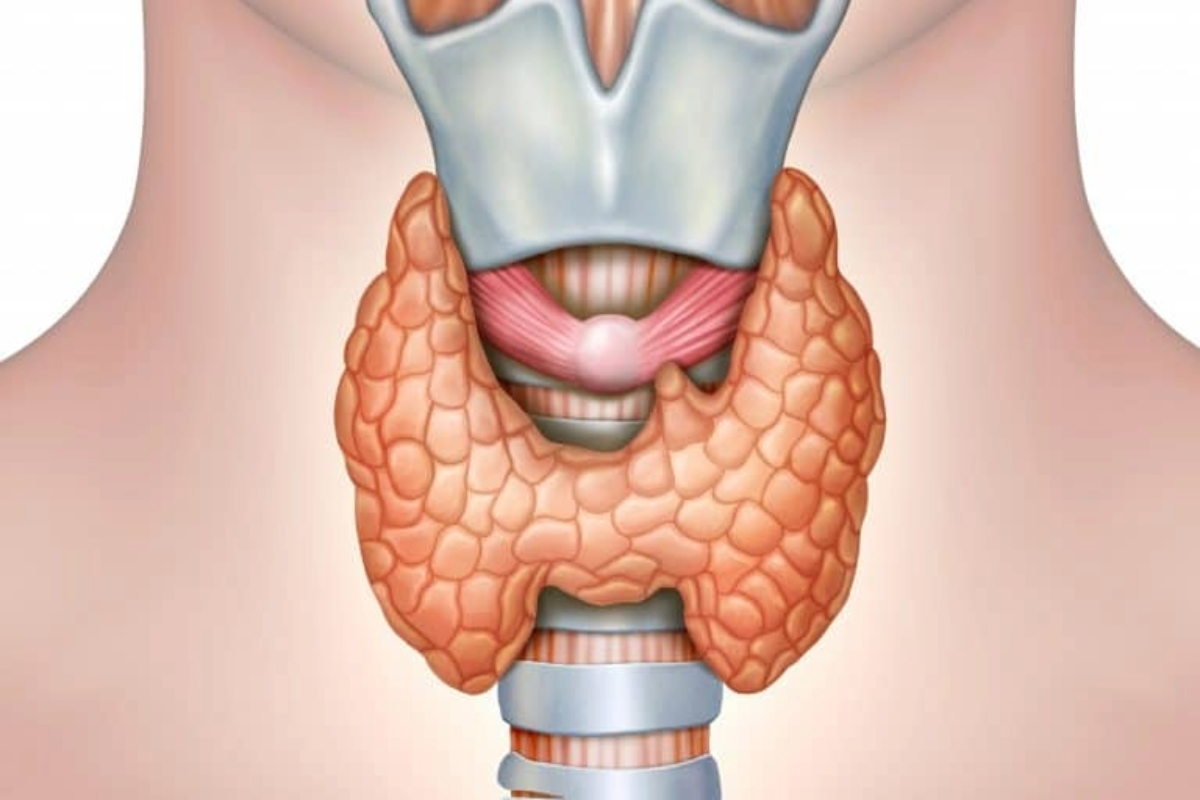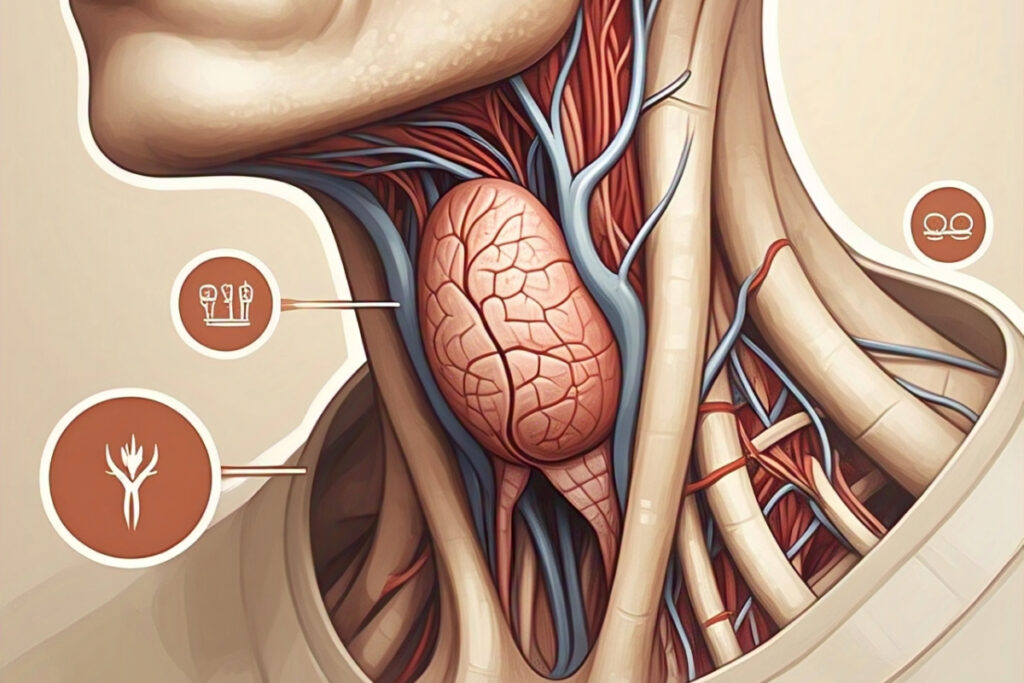Ever wondered why you’re suddenly exhausted, struggling with your weight, or feeling down for no obvious reason. Your thyroid may be the cause, rather than merely stress or a hectic lifestyle.
NHS (UK) — Thyroid Problems (Government Health Source): For reliable, government-backed information on thyroid conditions — including causes, symptoms, tests, and treatments — see NHS – Thyroid Problems .
This tiny gland in your neck does some serious behind-the-scenes work to keep your body functioning. From regulating your energy levels to managing your mood, the thyroid influences more than most people realize. Let’s examine what this gland is, its functions, and how to identify when something may be off.
Internal Resource — Thyroid & Stress Interaction: To understand how stress affects thyroid function and how the thyroid itself reacts to stress, see The Thyroid’s Reaction to Stress (and vice versa) .
Meet Your Thyroid: Small but Mighty

The thyroid is a tiny, butterfly-shaped gland situated directly beneath your voice box at the base of your neck. It may be small, but it has a big job: it creates hormones—mainly T3 and T4—that play a key role in controlling your metabolism.
In simple terms, your thyroid acts like a control panel. It helps decide how fast or slow your body works—from your heart rate and body temperature to how quickly you burn calories and process food.
Why the Thyroid Is Essential
Almost every system in your body is impacted by this little gland. Here is a brief synopsis of its functions:
- Controls metabolism: It aids in figuring out how your body uses fuel.
- Controls body temperature: Keeping you warm or cool as needed.
- Controls heart rate:Aids in preserving a sound rhythm.
- Affects brain function: Impacts mood, memory, and mental clarity.
- Promotes development and growth: particularly crucial for children and pregnant women.
When things are going well, you generally don’t give it much thought. But if hormone levels drift off course, your whole system can feel out of balance.
Pro Tip: Thyroid symptoms often overlap with stress, burnout, or nutritional deficiencies. If you’re experiencing ongoing fatigue, weight changes, mood swings, or temperature sensitivity, a simple blood test (TSH, Free T3, and Free T4) can help identify thyroid issues early. According to trusted medical sources like Mayo Clinic and Cleveland Clinic , early diagnosis leads to better symptom control and prevents long-term complications. Always consult a qualified healthcare professional for accurate diagnosis and treatment.
Common Thyroid Problems to Know About
Thyroid disorders are more common than many people think, and they can sneak up quietly. The main conditions that need to be considered are as follows:
- Hypothyroidism (Too Little Hormone)
This occurs when your body slows down due to insufficient hormone production by your thyroid.
Potential causes:
- Autoimmune disease (like Hashimoto’s)
- Surgery or radiation
- Not enough iodine in the diet
- Certain medications
You might feel:
- Constantly tired
- Gaining weight easily
- Depressed or mentally foggy
- Cold all the time
- Dry skin and hair
- Slowed heart rate
- Hyperthyroidism (Too Much Hormone)
Your body speeds up when your thyroid produces too many hormones due to overactivity.
Common causes:
- Graves’ disease
- Thyroid nodules
- Excess iodine intake
Symptoms include:
- Rapid heartbeat
- Weight loss without effort
- Feeling anxious or jittery
- Trouble sleeping
- Sweating more than usual
- Shaky hands
- Hashimoto’s Thyroiditis
An autoimmune disorder where the immune system attacks the thyroid, gradually reducing its function. It’s the leading cause of hypothyroidism.
Cleveland Clinic — Hashimoto’s Disease Overview (High Trust): For a reliable, expert-reviewed explanation of Hashimoto’s disease — including causes, symptoms, and treatment options — see Cleveland Clinic — Hashimoto’s Disease .
- Graves’ Disease
Another autoimmune issue, but this one overstimulates the thyroid, leading to hyperthyroidism. It’s often seen in younger adults.
Signs Your Thyroid Might Be Off

Because thyroid issues affect multiple systems, symptoms can vary widely—and often get mistaken for other things like aging or burnout.
| Underactive Thyroid | Overactive Thyroid |
| Feeling constantly tired | Feeling restless or wired |
| Gaining weight easily | Losing weight quickly |
| Cold intolerance | Heat sensitivity |
| Depression or sadness | Anxiety or irritability |
| Dry, flaky skin | Sweating and oily skin |
| Constipation | More frequent bowel movements |
Notice a few of these? It’s time to get checked out.
How Doctors Check Your Thyroid
Getting answers is usually simple. A blood test can give a clear snapshot of what’s happening with your thyroid.
- TSH (Thyroid Stimulating Hormone): Tells if your thyroid is working properly.
- The hormones that your thyroid actually generates are measured by levels T3 and T4.
- Antibody tests: Check for autoimmune conditions like Hashimoto’s or Graves’.
In some cases, your doctor might also order an ultrasound or scan if they feel anything unusual during a neck exam.
Internal Resource — Thyroid Tests Explained: For a clear breakdown of what TSH, T3, and T4 actually indicate and how they’re used in thyroid diagnosis, see Thyroid Tests Explained: What TSH, T3, and T4 Actually Indicate .
How to Support a Healthy Thyroid
Some thyroid issues require medical treatment, but there’s a lot you can do to support thyroid health naturally. Here are a few tips:
🥦 Eat to Nourish
- Make sure you’re getting enough iodine, but not too much.
- Add selenium (found in Brazil nuts and fish) and zinc (from legumes, seeds, and whole grains).
- Avoid too many ultra-processed foods and soy if you’re at risk.
🧘♀️ Reduce Stress
Chronic stress can mess with your hormones. Try things like yoga, deep breathing, or even short walks to unwind.
🚶 Stay Active
Daily movement—even gentle exercise—can boost metabolism and support mood.
😴 Prioritize Sleep
Aim for consistent, high-quality sleep. Your body resets and repairs while you rest, including your hormone system.
When Should You See a Doctor?
If something feels “off” and you’ve noticed changes in energy, weight, or mood that just don’t add up, it’s a good idea to talk to a doctor. Here are some red flags:
- Experiencing fatigue despite getting enough sleep
- Unexpected weight gain or loss
- Trouble concentrating or remembering things
- Mood changes, anxiety, or depression
- Thinning hair or dry skin
- Menstrual cycle changes or fertility issues
A simple test could help you get answers—and get back to feeling like yourself again.
Final Thoughts
The thyroid might be small, but it’s one of your body’s most powerful players. Whether it’s speeding things up or slowing them down, this little gland has a say in just about everything—from energy and focus to mood and weight.
Understanding how your thyroid works and paying attention to early warning signs can help you stay ahead of any issues. With the right care, your thyroid can keep doing its job quietly and effectively behind the scenes.
Internal Resource — Hyperthyroidism Warning Signs: For an informative list of eight key symptoms of hyperthyroidism that you should never ignore, see Hyperthyroidism Warning Signs: 8 Symptoms You Should Never Ignore .
Mayo Clinic — Thyroid Disease Overview (Trusted Medical Source): For a reliable, patient-friendly overview of thyroid disease, including common symptoms, causes, and clinical information, see Mayo Clinic — Thyroid Disease Overview .
FAQs
The thyroid is a small gland in your neck that controls metabolism, energy, mood, heart rate, and more by releasing key hormones.
Though small, the thyroid affects nearly every system in the body, making it essential to overall health and often overlooked.
The two most common are hypothyroidism (underactive thyroid) and hyperthyroidism (overactive thyroid), each with different symptoms.
A simple blood test measuring TSH, T3, and T4 levels can evaluate thyroid function. Your doctor may also check thyroid antibodies.
Medical Disclaimer: This content is provided for informational purposes only and is not intended as a substitute for professional medical advice, diagnosis, or treatment. Always seek the advice of a qualified healthcare provider with any questions you may have regarding a medical condition.


